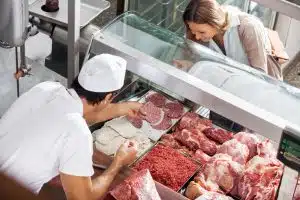 With the ever-changing landscape of regulations, butcher legal issues in the UK can be complicated for small businesses to decipher and stay up-to-date on. From EU and UK laws to health regulations, the amount of information to process can seem overwhelming. In order to remain compliant from a legal standpoint, an independent butcher must first understand their obligations and then accurately follow them.
With the ever-changing landscape of regulations, butcher legal issues in the UK can be complicated for small businesses to decipher and stay up-to-date on. From EU and UK laws to health regulations, the amount of information to process can seem overwhelming. In order to remain compliant from a legal standpoint, an independent butcher must first understand their obligations and then accurately follow them.
Key components of business like hygiene and food safety must always be taken into consideration, alongside other things like waste management, insurance and allergen labeling. Failure to do so may have dire consequences such as hefty fines or shutting down of the business entirely, both of which are financially damaging prospects. Fortunately there are multiple online resources available to help clarify these laws so that butchers can properly serve their customers and operate safely and within legal bounds
Today we will be walking you through the areas of legislation that directly affect the butchers industry in the United Kingdom. Read on for further information.
What licences does a butcher need?
The local environmental health department will require you to register your butchers shop since you will prepare, store, and sell food. Food Safety Act and regulations will be enforced by inspecting your premises. Before you start any food operations, you’ll need to register with your local authority at least 28 days before you begin. Registration is free of charge.
Selling game
As long as the game bird or venison you sell was lawfully killed, you don’t need a licence to sell it. Generally, venison dealers only need a license if they are wholesalers – retailers who buy venison only from licensed dealers don’t need one.
Background music
A Music Licence from PPL PRS Ltd is probably required if you plan to play background music in your shop. On the PPL PRS website, you can pay the annual fee online.
Food safety
There is strict food safety legislation that must be followed by all businesses in the food sector. Your business must be registered with the local authority’s environmental health department before opening. As part of the Food Safety Act and regulations, your local environmental health officer can provide advice and guidance regarding what you need to install in your premises in order to ensure your operating areas are hygienic.
Here are some things you should know:
- Observance of food safety and hygiene regulations, including HACCP procedures
- Regulations governing food labelling and information. Pre-packaged food like pies and sausages must be clearly labelled if you intend to supply other outlets, such as delicatessens
- Legislation pertaining to weights and measures. Weight-based or count-based sales are regulated by this law. It is mandatory to price and weigh loose food goods sold loose from bulk in metric units (although imperial units can also be shown if you wish).
Food waste
You must properly dispose of food waste if your business produces it. It cannot be fed to livestock or contaminate the environment. The legal limit for disposing of animal by-products through normal waste disposal is 20kg a week. If you use a waste carrier to remove your waste, make sure they’re properly authorised. The Gov.uk website provides more information about your responsibilities.
Carrier bag charge
A 5 pence charge applies to English businesses with fewer than 250 full-time equivalent employees, but small and medium businesses are exempt from the charge. The gov.uk website provides detailed guidance.
When retailers supply customers with a single-use carrier bag in Wales and Scotland, they must charge them at least 5 pence. No matter what type of single-use bag you use, whether it’s plastic, paper or plant-based starch, the rule applies. You can find detailed guidance on the Zero Waste Scotland and Gov.Wales websites.
Retailers in Northern Ireland are required to charge a 5 pence levy on all single-use or reusable bags with a retail price below 20 pence (including free bags).
Health & Safety, fire
Legislation governing workplace health and safety and fire safety must be followed.
Employment legislation
Employment legislation must be followed by anyone who employs employees. Legislation covers a wide range of topics, including recruitment, employment contracts, pay, working hours, holidays, employment policies, sickness, maternity, paternity, discrimination, discipline, grievances, dismissals, and redundancies.
Insurance for a butcher
You should speak with an insurance company or broker and explain your business plan – they will explain the insurance coverage you need to comply with the law as well as what you should consider for other types of coverage. The following may be included:
- Premises, premises contents and stock
- Goods in transit (for example on the way back from a cash and carry, or delivering to customers)
- Freezer breakdown
- Cash
- Business interruption
- Employers liability
- Public and products liability
- Motor insurance (for delivery vehicles)
Use an insurance comparison form to uncover differences between policies when comparing insurance quotes.
Read more: Butcher shop sector trends
Conclusion
Butchers have to bear a huge responsibility when it comes to producing and serving safe food products. This includes carefully following local, state and federal regulations related to meat production, storage, preparation and sale. Butchers also need to be aware of additional legal issues specific to the industry, such as maintaining hygiene standards, preventing cross-contamination between ingredients, keeping detailed records of their ingredients, customers and suppliers, abiding by labeling requirements and adhering to animal welfare regulations.
Although there are several challenges posed by these legal obligations for butchers, ensuring compliance with them is essential for running a successful business in this field.
Lee Jones is a seasoned Business Finance Specialist with over two decades of invaluable experience in the financial sector. With a keen eye for market trends and a passion for helping businesses thrive, Lee has become a trusted advisor to countless organizations seeking to navigate the complexities of finance.


